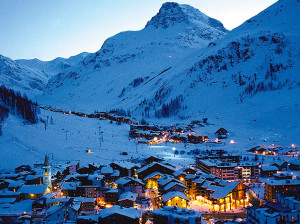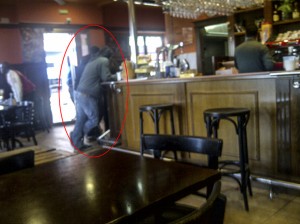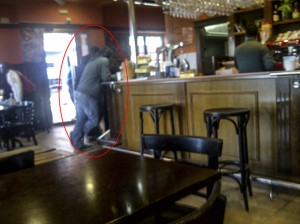 Yesterday I ate a tomato that had no taste whatsoever and it started me thinking…… In the wine trade, we make, market and sell wine by variety, so why doesn’t this approach apply to every fruit and vegetable – growing and selling them according to their variety, and more importantly, their flavour. Now I know there will be people who will jump on this apparent generalisation, and I do acknowledge that there are already many shops and supermarkets that clearly advertise both the variety and their provenance, but this is not a worldwide concept.
Yesterday I ate a tomato that had no taste whatsoever and it started me thinking…… In the wine trade, we make, market and sell wine by variety, so why doesn’t this approach apply to every fruit and vegetable – growing and selling them according to their variety, and more importantly, their flavour. Now I know there will be people who will jump on this apparent generalisation, and I do acknowledge that there are already many shops and supermarkets that clearly advertise both the variety and their provenance, but this is not a worldwide concept.
Imagine for a moment that you walked into your favourite wine shop, and the only way you could identify your selection was by the colour, as though it was assumed that every white wine, and every red wine tasted the same (and that the variety of grape really didn’t matter). This thought brings me neatly back to my tomatoes. Why shouldn’t I be able to walk into my local supermarket and knowingly select the variety of tomato that I like and prefer to buy? Why does it have to be a secret?
Of course, I already know the answer to that question – many fruits and veg are grown simply because they are prolific, and not necessarily because they have the best taste (there is even a variety of tomato called ‘moneymaker’). Now, I am not saying for one moment that we should stop growing these abundant croppers, but I am simply saying help us to identify them, and let us make the choice. As with my wine selections, I for one would not mind paying a few cents extra to buy a fruit or veg that I know I am going to appreciate….. it just makes more sense.
For example, in many countries it is very common to display the category of potato that we buy, depending on whether it is required for boiling, baking or frying etc. – but unfortunately not here in Galicia (ironically a big potato producing area). Yes, I can buy bags that are marked ‘for frying’, ‘for boiling’ etc., but the problem is that I do not agree with their selections! I end up with limp, soggy french fries, or hard, waxy boiled potatoes – I can never find what I really want. Very fortunately, I can at least buy my apples and pears by variety, but nearly everything else is pot luck!
OK, so I’ve had my little rant and got it off my chest, but if you stop to think about it for a moment, why shouldn’t the consumer be able to chose, or at least have more information so that they can make an informed selection? It wouldn’t cost any more to tell us what we’re buying…..
 Yesterday I ate a tomato that had no taste whatsoever and it started me thinking…… In the wine trade, we make, market and sell wine by variety, so why doesn’t this approach apply to every fruit and vegetable – growing and selling them according to their variety, and more importantly, their flavour. Now I know there will be people who will jump on this apparent generalisation, and I do acknowledge that there are already many shops and supermarkets that clearly advertise both the variety and their provenance, but this is not a worldwide concept.
Yesterday I ate a tomato that had no taste whatsoever and it started me thinking…… In the wine trade, we make, market and sell wine by variety, so why doesn’t this approach apply to every fruit and vegetable – growing and selling them according to their variety, and more importantly, their flavour. Now I know there will be people who will jump on this apparent generalisation, and I do acknowledge that there are already many shops and supermarkets that clearly advertise both the variety and their provenance, but this is not a worldwide concept.
Imagine for a moment that you walked into your favourite wine shop, and the only way you could identify your selection was by the colour, as though it was assumed that every white wine, and every red wine tasted the same (and that the variety of grape really didn’t matter). This thought brings me neatly back to my tomatoes. Why shouldn’t I be able to walk into my local supermarket and knowingly select the variety of tomato that I like and prefer to buy? Why does it have to be a secret?
Of course, I already know the answer to that question – many fruits and veg are grown simply because they are prolific, and not necessarily because they have the best taste (there is even a variety of tomato called ‘moneymaker’). Now, I am not saying for one moment that we should stop growing these abundant croppers, but I am simply saying help us to identify them, and let us make the choice. As with my wine selections, I for one would not mind paying a few cents extra to buy a fruit or veg that I know I am going to appreciate….. it just makes more sense.
For example, in many countries it is very common to display the category of potato that we buy, depending on whether it is required for boiling, baking or frying etc. – but unfortunately not here in Galicia (ironically a big potato producing area). Yes, I can buy bags that are marked ‘for frying’, ‘for boiling’ etc., but the problem is that I do not agree with their selections! I end up with limp, soggy french fries, or hard, waxy boiled potatoes – I can never find what I really want. Very fortunately, I can at least buy my apples and pears by variety, but nearly everything else is pot luck!
OK, so I’ve had my little rant and got it off my chest, but if you stop to think about it for a moment, why shouldn’t the consumer be able to chose, or at least have more information so that they can make an informed selection? It wouldn’t cost any more to tell us what we’re buying…..
 On the last leg of our journey home from Madrid to Vigo last week, we flew on the recently created Iberia Express – supposedly the discount airline of Iberia. I had noticed on our outbound flight that they had boasted 97% punctuality for the whole of 2014, but it wasn’t until the return leg that I fully understood how they achieved this remarkable number…..
On the last leg of our journey home from Madrid to Vigo last week, we flew on the recently created Iberia Express – supposedly the discount airline of Iberia. I had noticed on our outbound flight that they had boasted 97% punctuality for the whole of 2014, but it wasn’t until the return leg that I fully understood how they achieved this remarkable number….. On the last leg of our journey home from Madrid to Vigo last week, we flew on the recently created Iberia Express – supposedly the discount airline of Iberia. I had noticed on our outbound flight that they had boasted 97% punctuality for the whole of 2014, but it wasn’t until the return leg that I fully understood how they achieved this remarkable number…..
On the last leg of our journey home from Madrid to Vigo last week, we flew on the recently created Iberia Express – supposedly the discount airline of Iberia. I had noticed on our outbound flight that they had boasted 97% punctuality for the whole of 2014, but it wasn’t until the return leg that I fully understood how they achieved this remarkable number…..










